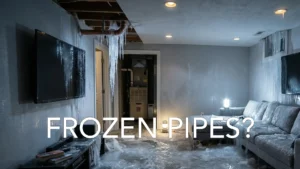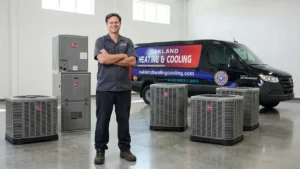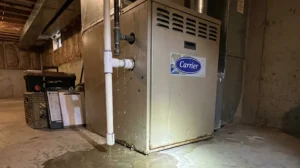Have you ever wondered how your home stays warm in winter and cool in summer? The answer lies in your HVAC system. HVAC stands for Heating, Ventilation, and Air Conditioning, and it plays a crucial role in keeping indoor spaces comfortable. Whether you’re a homeowner, renter, or just curious, understanding the basics of HVAC systems can help you make better decisions about maintenance, energy efficiency, and even choosing the right system for your needs.
In this guide, we’ll break down the key components, different types of HVAC systems, how they work, and some essential maintenance tips.

What is an HVAC System?
An HVAC system is a combination of technologies that regulate temperature, humidity, and air quality in residential and commercial buildings. It ensures that your home stays warm during winter, cool during summer, and well-ventilated year-round.
A standard HVAC system includes:
- Heating (H) – Provides warmth using a furnace, heat pump, or boiler.
- Ventilation (V) – Ensures fresh air circulates while removing odors, smoke, and moisture.
- Air Conditioning (AC) – Cools indoor air by removing heat and humidity.
Each component works together to maintain a comfortable indoor environment.
How Does an HVAC System Work?
The working mechanism of an HVAC system depends on its type, but here’s a general breakdown:
- Heating Process:
- A furnace burns fuel (gas, oil, or electricity) to generate heat.
- Heat is distributed through ducts or radiators to warm the space.
- A thermostat controls the temperature by signaling the system to turn on or off.
- Cooling Process:
- An air conditioner removes heat from indoor air using refrigerants.
- The cooled air is circulated back into the home through vents.
- A compressor, condenser coil, and evaporator coil work together to complete the cooling cycle.
- Ventilation Process:
- Fresh outdoor air enters the system, while indoor pollutants are removed.
- Filters trap dust, pollen, and allergens to improve air quality.
- Exhaust fans remove stale air, preventing moisture buildup.
Types of HVAC Systems
HVAC systems come in different types, depending on the size of the building and climate conditions. Here are the most common types:
1. Split System HVAC
Best for: Homes with existing ductwork
Includes: An indoor unit (furnace) and an outdoor unit (AC or heat pump)
Pros: Energy-efficient, good for large homes
Cons: Requires space for ducts
2. Ductless Mini-Split System
Best for: Homes without ductwork, small apartments
Includes: Individual air handlers in different rooms
Pros: Flexible installation, energy-efficient
Cons: Higher upfront cost
3. Hybrid System (Dual Fuel System)
Best for: Areas with extreme temperature fluctuations
Includes: A combination of gas furnace and electric heat pump
Pros: Cost-effective in the long run
Cons: Higher initial investment
4. Packaged HVAC System
Best for: Small commercial spaces or homes with limited indoor space
Includes: All components in one outdoor unit
Pros: Space-saving, easy to install
Cons: Less energy-efficient compared to split systems
HVAC System Maintenance Tips
Regular maintenance helps your HVAC system run efficiently and last longer. Here are some essential maintenance tips:
Change Air Filters Regularly – Dirty filters reduce airflow and make the system work harder. Replace them every 1-3 months.
Schedule Annual Inspections – A professional HVAC technician can check for issues before they become major problems.
Clean Vents and Ducts – Dust and debris can block airflow, reducing efficiency.
Check the Thermostat Settings – Use programmable thermostats to save energy.
Inspect Outdoor Units – Keep the condenser unit free from dirt, leaves, and debris.
Conclusion
Understanding your HVAC system helps you maintain it properly, reduce energy bills, and improve indoor air quality. Whether you’re considering a new system or maintaining an existing one, these basics will guide you in making informed decisions.
If you’re unsure about anything, don’t hesitate to contact an HVAC professional for expert advice.
Frequently Asked Questions
How often should I replace my HVAC filter?
It’s best to change your HVAC filter every 1-3 months, depending on usage and indoor air quality. Homes with pets or allergies may need more frequent replacements.
What’s the ideal thermostat setting for energy savings?
In summer, set your thermostat to 78°F (26°C) when you’re home and higher when you’re away. In winter, keep it at 68°F (20°C) for maximum efficiency.
How can I improve my HVAC system’s efficiency?
Regular maintenance, sealing leaks in ducts, using a programmable thermostat, and upgrading to an energy-efficient system can improve performance and lower energy costs.
What are the signs that my HVAC system needs repair?
Watch for unusual noises, weak airflow, increased energy bills, uneven heating/cooling, and frequent cycling on and off.
How long do HVAC systems typically last?
Most HVAC systems last between 15-20 years with proper maintenance. Furnaces and air conditioners may need replacement sooner if they are not well-maintained.
Is it necessary to have an HVAC professional inspect my system?
Yes! A professional inspection once or twice a year helps catch potential problems early, ensuring your system runs efficiently and lasts longer.




